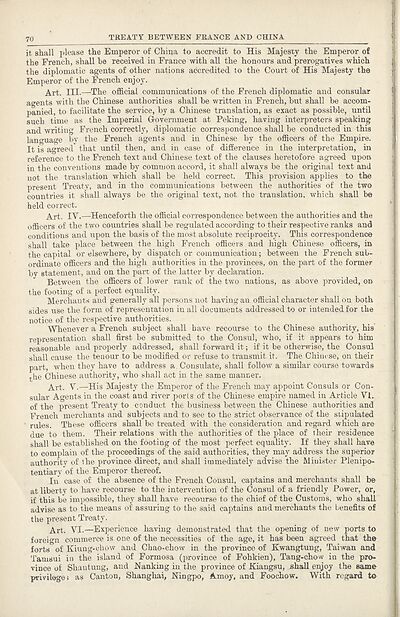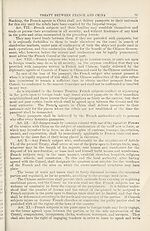1924
(126) Page 70
Download files
Complete book:
Individual page:
Thumbnail gallery: Grid view | List view

70
TREATY BETWEEN PRANCE AND CHINA
it shall please the Emperor of China to accredit to His Majesty the Emperor of
the French, shall be received in France with all the honours and prerogatives which
the diplomatic agents of other nations accredited to the Court of His Majesty the
Emperor of the French enjoy.
Art. III.—The official communications of the French diplomatic and consular
agents with the Chinese authorities shall be written in French, but shall be accom¬
panied, to facilitate the service, by a Chinese translation, as exact as possible, until
such time as the Imperial Gl-overnment at Peking, having interpreters speaking
and writing French correctly, diplomatic correspondence shall be conducted in this
language by the French agents and in Chinese by the officers of the Empire.
It is agreed* that until then, and in case of difference in the interpretation, in
reference to the French text and Chinese text of the clauses heretofore agreed upon
in the conventions made by common accord, it shall always be the original text and
not the translation which shall be held correct. This provision applies to the
present Treaty, and in the communications between the authorities of the two
countries it shall always be the original text, not the translation, which shall be
held correct.
Art. IY.—Henceforth the official correspondence between the authorities and the
officers of the two countries shall be regulated according to their respective ranks and
conditions and upon the basis of the most absolute reciprocity. This correspondence
shall take place between the high French officers and high Chinese officers, in
the capital or elsewhere, by dispatch or communication; between the French sub¬
ordinate officers and the high authorities in the provinces, on the part of the former
by statement, and on the part of the latter by declaration.
Between the officers of lower rank of the two nations, as above provided, on
the footing of a perfect equality.
Merchants and generally all persons not having an official character shall on both
sides use the form of representation in all documents addressed to or intended for the
notice of the respective authorities.
Whenever a French subject shall have recourse to the Chinese authority, his
representation shall first be submitted to the Consul, who, if it appears to him
reasonable and properly addressed, shall forward it; if it be otherwise, the Consul
shall cause the tenour to be modified or refuse to transmit it. The Chinese, on their
part, when they have to address a Consulate, shall follow a similar course towards
the Chinese authority, who shall act in the same manner.
Art. V.—His Majesty the Emperor of the French may appoint Consuls or Con¬
sular Agents in the coast and river ports of the Chinese empire named in Article VI.
of the present Treaty to conduct the business between the Chinese authorities and
French merchants and subjects and to see to the strict observance of the stipulated
rules. These officers shall be treated with the consideration and regard which are-
due to them. Their relations with the authorities of the place of their residence
shall be established on the footing of the most perfect equality. If they shall have
to complain of the proceedings of the said authorities, they may address the superior
authority of the province direct, and shall immediately advise the Minister Plenipo¬
tentiary of the Emperor thereof.
In' case of the absence of the French Consul, captains and merchants shall be
at liberty to have recourse to the intervention of the Consul of a friendly Power, or,
if this be impossible, they shall have recourse to the chief of the Customs, who shall
advise as to the means of assuring to the said captains and merchants the benefits of
the present Treaty.
Art. VI.—Experience having demonstrated that the opening of new ports to
foreign commerce is one of the necessities of the age, it has been agreed that the
forts” of Kiung-ehow and Chao-chow in the province of Kwangtung, Taiwan and
Tamsui in the island of Formosa (province of Fohkien), Tang-chow in the pro¬
vince of Shantung, and Nanking in the province of Kiangsu, shall enjoy the same
privileges as Canton, Shanghai, JSTingpo, Amoy, and Foochow. With regard to
TREATY BETWEEN PRANCE AND CHINA
it shall please the Emperor of China to accredit to His Majesty the Emperor of
the French, shall be received in France with all the honours and prerogatives which
the diplomatic agents of other nations accredited to the Court of His Majesty the
Emperor of the French enjoy.
Art. III.—The official communications of the French diplomatic and consular
agents with the Chinese authorities shall be written in French, but shall be accom¬
panied, to facilitate the service, by a Chinese translation, as exact as possible, until
such time as the Imperial Gl-overnment at Peking, having interpreters speaking
and writing French correctly, diplomatic correspondence shall be conducted in this
language by the French agents and in Chinese by the officers of the Empire.
It is agreed* that until then, and in case of difference in the interpretation, in
reference to the French text and Chinese text of the clauses heretofore agreed upon
in the conventions made by common accord, it shall always be the original text and
not the translation which shall be held correct. This provision applies to the
present Treaty, and in the communications between the authorities of the two
countries it shall always be the original text, not the translation, which shall be
held correct.
Art. IY.—Henceforth the official correspondence between the authorities and the
officers of the two countries shall be regulated according to their respective ranks and
conditions and upon the basis of the most absolute reciprocity. This correspondence
shall take place between the high French officers and high Chinese officers, in
the capital or elsewhere, by dispatch or communication; between the French sub¬
ordinate officers and the high authorities in the provinces, on the part of the former
by statement, and on the part of the latter by declaration.
Between the officers of lower rank of the two nations, as above provided, on
the footing of a perfect equality.
Merchants and generally all persons not having an official character shall on both
sides use the form of representation in all documents addressed to or intended for the
notice of the respective authorities.
Whenever a French subject shall have recourse to the Chinese authority, his
representation shall first be submitted to the Consul, who, if it appears to him
reasonable and properly addressed, shall forward it; if it be otherwise, the Consul
shall cause the tenour to be modified or refuse to transmit it. The Chinese, on their
part, when they have to address a Consulate, shall follow a similar course towards
the Chinese authority, who shall act in the same manner.
Art. V.—His Majesty the Emperor of the French may appoint Consuls or Con¬
sular Agents in the coast and river ports of the Chinese empire named in Article VI.
of the present Treaty to conduct the business between the Chinese authorities and
French merchants and subjects and to see to the strict observance of the stipulated
rules. These officers shall be treated with the consideration and regard which are-
due to them. Their relations with the authorities of the place of their residence
shall be established on the footing of the most perfect equality. If they shall have
to complain of the proceedings of the said authorities, they may address the superior
authority of the province direct, and shall immediately advise the Minister Plenipo¬
tentiary of the Emperor thereof.
In' case of the absence of the French Consul, captains and merchants shall be
at liberty to have recourse to the intervention of the Consul of a friendly Power, or,
if this be impossible, they shall have recourse to the chief of the Customs, who shall
advise as to the means of assuring to the said captains and merchants the benefits of
the present Treaty.
Art. VI.—Experience having demonstrated that the opening of new ports to
foreign commerce is one of the necessities of the age, it has been agreed that the
forts” of Kiung-ehow and Chao-chow in the province of Kwangtung, Taiwan and
Tamsui in the island of Formosa (province of Fohkien), Tang-chow in the pro¬
vince of Shantung, and Nanking in the province of Kiangsu, shall enjoy the same
privileges as Canton, Shanghai, JSTingpo, Amoy, and Foochow. With regard to
Set display mode to:
![]() Universal Viewer |
Universal Viewer | ![]() Mirador |
Large image | Transcription
Mirador |
Large image | Transcription
Images and transcriptions on this page, including medium image downloads, may be used under the Creative Commons Attribution 4.0 International Licence unless otherwise stated. ![]()
| Asian directories and chronicles > 1924 > (126) Page 70 |
|---|
| Permanent URL | https://digital.nls.uk/196425568 |
|---|
| Attribution and copyright: |
|
|---|---|
| Description | Volumes from the Asian 'Directory and Chronicle' series covering 1917-1941, but missing 1919 and 1923. Compiled annually from a multiplicity of local sources and research. They provide listings of each country's active corporations, foreign residents and government agencies of all nationalities for that year, together with their addresses. Content includes: various treaties; coverage of conflicts; currencies and taxes; consular fees; weights and measures; public holidays; festivals and traditions. A source of information for both Western states and communities of foreigners living in Asia. Published by Hongkong Daily Press. |
|---|---|
| Shelfmark | H3.86.1303 |
| Additional NLS resources: |
![[Page 69]France: Treaty between France and China](https://deriv.nls.uk/dcn4/1964/2555/196425557.4.jpg)
